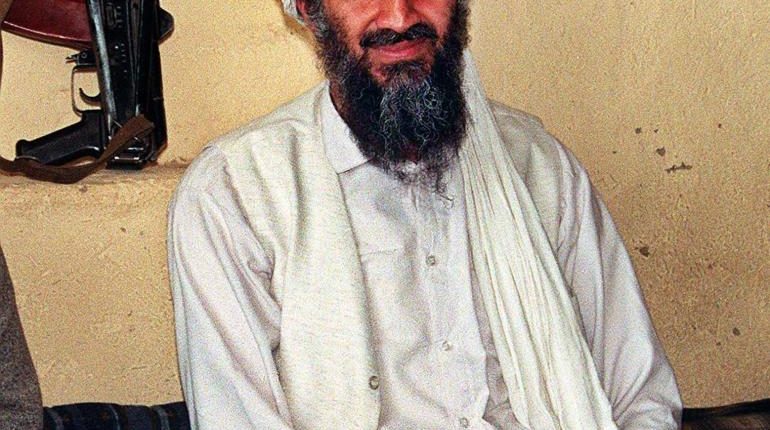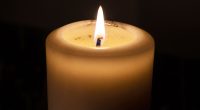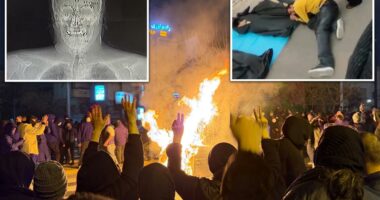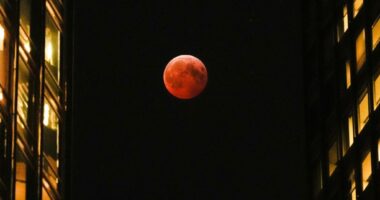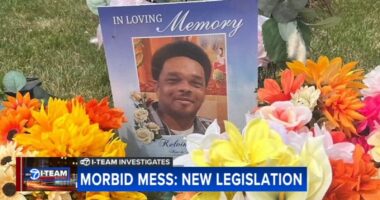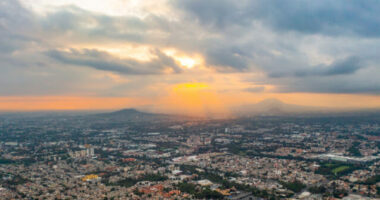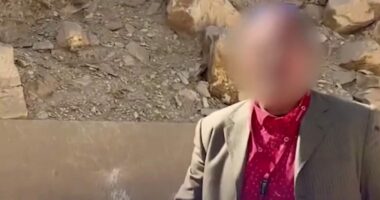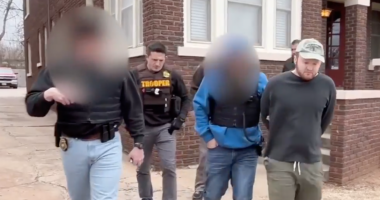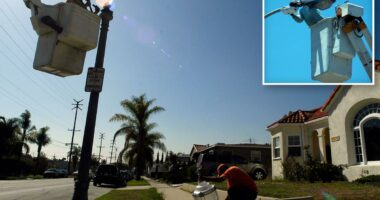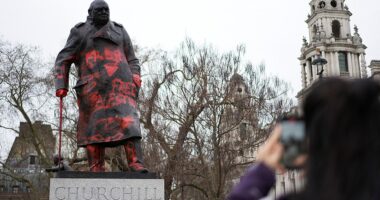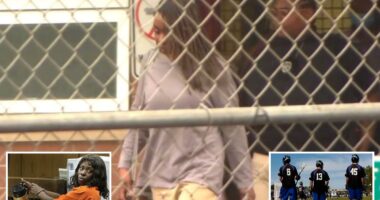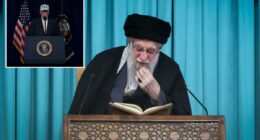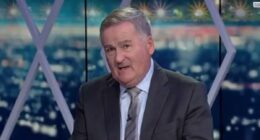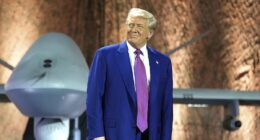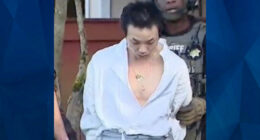Share this @internewscast.com
HE was the most wanted terrorist in history.
But it took the American intelligence services almost 10 years to hunt down Osama Bin Laden after the 9/11 terror attacks shocked the world.
The new Netflix documentary, American Manhunt: Osama bin Laden, explores the intense, decade-long international missions aimed at capturing the world’s most infamous criminal.
Additionally, it delves into the significant mistakes that delayed the Al Qaeda leader’s capture, with a high-ranking CIA official openly confessing they “could have ended it” merely months following the attack.
From the moment the World Trade Centre fell, US intelligence officers were focused on working out who was responsible.
Right away, the CIA started scrutinizing the flight manifests—documents listing all passengers aboard the hijacked planes that struck the two towers—since the terrorists would also be listed.
Gina Bennett, a CIA counter-terrorism analyst, says: “There was a name on a manifest that was suspected of being a pretty major Al Qaeda operative.
“For years that was the terrorist group that we knew was determined to attack the United States. That name, that moment, there was just no way that was a coincidence. We knew immediately this was Osama bin Laden.”
Gina was part of a crack CIA team, mainly women, who had been focusing on Bin Laden since the Nineties.
Her colleague Cindy Storer says: “We knew that Bin Laden was operating training camps and safe houses against the Soviet Union.
“When the war was over, we discovered he turned those camps into training camps for Islamic militants to go out and attack other countries. We knew they had terrorist capabilities.
“So we didn’t know to what extent they were going to come directly after the US.”
Attacks started across the world, heralding a new wave of terrorism, and in the months before 9/11, there was intelligence that Al Qaeda posed a threat to American targets.
Gina says: “All the indicators were that something big was happening.”
Cindy adds: “We got reporting that people in Bin Laden’s network were calling their mothers and telling them goodbye and stuff like that. Something very serious was about to happen.”
Unimaginable atrocity
The US government was warned by the CIA that the likely targets would be famous landmarks or symbols of US capitalism – but they did not know when or how.
And none of them could have imagined the extent or horror of 9/11 when it did happen.
Cindy says: “You can’t not feel some responsibility for not stopping an attack that occurred on your watch. So you can’t help but question yourself.”
It soon became clear that the Taliban government in Afghanistan were providing a safe haven for Bin Laden, who became the world’s most wanted man after the events of 9/11 left 2,977 people dead.
We got reporting that people in Bin Laden’s network were calling their mothers and telling them goodbye and stuff like that. Something very serious was about to happen
Cindy Storer
So America gave them an opportunity to turn him over, which they refused.
Just four days after 9/11, President Bush decided to go to war and put the CIA and its counterterrorism boss, Cofer Black, in charge of hunting him down.
‘Operation Jawbreaker’ sent small teams of CIA agents behind enemy lines to work with their Afghan allies, the Northern Alliance, who were already fighting the Taliban.
And Cofer Black’s instructions were clear – he wanted Bin Laden’s head on a stick to present to President Bush.
By December, the Americans and the Northern Alliance had taken control of all the major Afghan cities – but Bin Laden had got away.
American intelligence located his whereabouts in the mountainous stronghold of Tora Bora, and a team was sent up to find him.
They needed military reinforcements, but they were denied. The decision was made to bomb anyway, despite CIA protestations that they needed support.
The mountain cave was hit for 56 hours with some of the heaviest bombing since World War Two – but there was no proof Bin Laden was dead and fears grew that escape routes had not been sealed off.
Then, six months later, the Americans’ worst fears were realised – film footage emerged proving Bin Laden was alive.
Cofer Black says: “We could have ended it and moved on. It would have given some closure to the survivors in New York.
“This was the best chance we ever had and I am sorry we didn’t take it.”
Hunt for the henchmen
As Bin Laden released another propaganda video, the hunt for him and his henchmen intensified.
The Al Qaeda founder was at the top; after him was his deputy Al Zawahiri. Next in command were a handful of lieutenants who were also very close to Bin Laden.
These were Abu Zubaydah, who was suspected to be Bin Laden’s chief operations operative, and a mysterious figure known only as Mukhtar.
In December 2001, three months after 9/11, a flight attendant on an American airliner thwarted another terror attack when he discovered a passenger with a bomb in his shoes.
The investigators felt they were at a dead end, but then they managed to capture Abu Zubaydah in a raid in Pakistan.
Unbelievably, he cooperated with the FBI and named the mysterious Mukhtar as a man they had been tracking for years – Khalid Sheikh Mohammed, known as KSM.
But that was nothing compared to what happened next.
Mastermind unmasked
Zubaydah revealed KSM was not just one of Bin Laden’s closest accomplices, but the chief planner behind the September 11 attacks.
FBI Special Agent Ali Sofan says: “He was the architect, the visionary, the mastermind of 9/11.”
He had been the man behind the first attack on the World Trade Centre back in 1993, but considered it a failure when he failed to topple the towers.
So he found his way to Afghanistan and Al Qaeda and pitched an idea to Osama Bin Laden to target not only the World Trade Centre, but also the Capitol Building and the Pentagon.
After 9/11, KSM went into hiding, but intelligence revealed he was in Pakistan.
In March 2003, they raided his villa in Rawalpindi, and he was captured. But what became clear was that Bin Laden was still very much in charge – and there were real concerns about additional attacks.
In the months that followed came the 2004 Madrid train bombings, which killed 193 people, then the 7/7 bombings in London that left 52 dead.
Cindy Storer says: “There was attack after attack, we knew there could be another attack at any time, anywhere.”
KSM provided information about Al Qaeda as an organisation. But there was one thing he wouldn’t talk about – Bin Laden.
The hunt for Bin Laden stalled. But the terror plots continued – another was uncovered to blow up the New York subway, another to blow up 15 airliners over the US.
Bin Laden was looking for his next 9/11.
Monster hunt
In September 2007, six years after 9/11, Bin Laden released a new videotape proving he was alive and still plotting against the US. But the trail on him had gone cold.
Barack Obama was sworn in as US President, and he told the CIA their number one task was to find Bin Laden.
The CIA analysed every video Bin Laden put out, and the focus was on how he was getting them to the news – there must be a trusted courier.
An Al Qaeda operative arrested in Africa named the courier as Abu Ahmed.
But he proved elusive until the summer of 2010, when they were able to track his phone to Pakistan.
They managed to follow him to a large house in Abbottabad. It was a bigger compound than any other in the area, boasting 18ft tall walls topped with barbed wire. It was clear that someone of high value was located there.
The CIA started immediate surveillance of the compound, but it had no phones or internet, and all their rubbish was burned.
They started to track the women and children who were seen coming and going, and they discovered that there were two families living in the compound – those of Abu Ahmed and his brother.
But then satellite footage revealed that there was a third family living in the house that never left the compound.
There was a man who would come outside every day and walk in the garden, but the walls and security meant it was impossible to get a clear image of his face.
Without exact proof that Bin Laden was there, it was difficult for the President to make a decision to take action against the compound.
If this was a botched operation, his reputation would be in tatters. But he asked the CIA to prepare to go into the compound.
Bin Laden’s reign of terror
By Kevin Adjei-Darko
EVIL mastermind Osama Bin Laden orchestrated some of the deadliest terror attacks the world has ever seen.
As the leader of al-Qaeda, he was the brain behind the September 11, 2001 atrocities that killed nearly 3,000 people in New York, Washington D.C., and Pennsylvania.
Nineteen hijackers took over four planes, slamming two into the Twin Towers, one into the Pentagon, and another crashing in a field after passengers fought back.
Before 9/11, Bin Laden’s fingerprints were all over other deadly plots. In 1998, he ordered truck bombings at US embassies in Kenya and Tanzania, killing 224 and injuring thousands.
In 2000, al-Qaeda struck again with the bombing of the USS Cole in Yemen, killing 17 American sailors.
Bin Laden used his fortune and twisted ideology to fund global jihad, radicalise followers, and build terror networks.
The Saudi-born terror chief became the world’s most wanted man, hiding in plain sight in Pakistan for years before U.S. Navy SEALs took him out in a daring 2011 raid.
Admiral William McRaven, head of the Navy Seals, was tasked with planning the raid.
Seal Team Six was sent to Jalalabad, where they built a mock-up of the compound and practised for weeks.
On May 1, 2011, the most classified operation of the last 20 years was launched. Bin Laden’s codename was Geronimo.
As the helicopters carrying the team hovered over the compound, one of them crashed – but miraculously, the Navy Seals walked away.
The crash had awoken the neighbourhood, but the decision was taken to carry on with the mission.
Within minutes, the Seals were within the compound and shot and killed Abu Ahmed.
As they made their way up the stairs, their next target was Bin Laden’s son, Khalid. As the Seals peeled off to search, there were only two of them left to go to the top floor, where Bin Laden could be hiding.
Officer Robert J O’Neill says: “Standing in front of me, two feet away, was Osama Bin Laden. It was one of those moments in life where it did slow down.
“He’s taller than I thought, he’s skinnier than I thought. His beard was grey/white. But I recognised his nose. This is definitely him. He’s not surrendering, he’s a threat, not just to me but to my team. He has to die.”
Back in America, President Obama and his team were about to hear the words America had wanted for 10 long years: “Geronimo, Geronimo, we got him.”
American Manhunt: Osama bin Laden is out now on Netflix.
